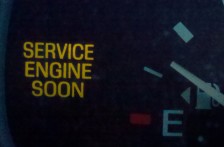
Yesterday I was driving to Beaver Creek Nordic Area south of my hometown of Lander, WY, when the “Service Engine Soon” indicator light came on.
“Just great,” I thought. Suddenly I became uneasy, concerned if I was going to have car problems. Sure, I had my cell phone and I’m a member of AAA and I’m in shape enough to hoof it some miles if necessary. Still, the anxiety that encompassed me because of the constant reminder of this “alert” was disconcerting. It was nagging at me. Try as I might, I couldn’t get the alert and the uneasiness it cast over me, out of my mind.
My destination was on South Pass, on the Continental Divide, about 26 miles away, where there is no cell phone signal.
The “Service Engine Soon” alert could mean I was about to have car problems. Or, it could mean that it’s not an emergency, just to be mindful of getting the engine serviced. I could have hundreds of miles to drive with that alert lit up without anything happening. I resigned to the latter. I just couldn’t bring myself to ditch the pre-arranged ski outing I had planned.
This got me thinking about the “Service Engine Soon” alert and how it is a great metaphor in so many situations in life. I began to realize that a version of this alert — the nagging and uneasiness it brings with it — happens frequently for me. It just doesn’t show itself in the form of a lit-up alert that is in front of my face.
Here are some examples of when my own”Service Engine Soon” alert is detected:
• My parents live here in town. I want to spend more time with them. When a couple of days have gone by and I haven’t talked to either of them, my “Service Engine Soon” alert comes on.
• If it’s been a few days and I haven’t been to the gym, the “Service Engine Soon” nagging kicks in.
• When the day is finally over and everyone in our house is in bed and sleeping. Except for me. I’m thinking about a question one of our sons asked that I didn’t at the time hear or respond to. The “Service Engine Soon” alerts me and I make a mental note that I need to make this right at the earliest opportunity. It’s too important not to, and I’m sorry I wasn’t paying better attention.
• When it’s Friday and I’m reviewing my task/to-do list for the week and realize there is a task or two that were to be done earlier in the week and should be checked off, but for one reason or another I keep ignoring or working around them.
• When I’ve skipped going to church, especially if it’s becoming too frequent of an occurrence. When I drive by the church, the “Service Engine Soon” alert inside me goes off.
• It’s been a month since I’ve had a “date night” with my husband, Jerry. We usually enjoy a couple of date nights every month. The indicator goes off in my mind if we haven’t been honoring this.
• I have two sisters and a brother, who all have families and do not live in Lander. They mean the world to me. And yet, I’m not keeping in good touch with them — and I want and intend to. Again, I can detect the alert and its nagging as a result of this.
• I’ve received not one, but two, reminders from the dentist about an appointment for teeth cleaning/oral prevention.
• The basement continues to be cluttered, despite my intention to gradually be making progress in sorting through it.
Of course this is only a small sampling. In reviewing this, it’s clear to me that this “Service Engine Soon” detection brings with it not only a nagging, but also feelings of guilt. In my experience, when I feel guilt that is self-imposed (not guilt placed on me by others), it usually means I’m not honoring things that are of value to me, and as a result, there could be unwanted consequences.
For this reason, I value the “Service Engine Soon” alert implications in my own life. (By the way, I made it to my destination and had a stellar morning of skiing. But when I got back in the car to return home, there was that pesky alert again. It didn’t go away. The engine still needs serviced.)
Do you ever have “Service Engine Soon” moments, and if so, would you care to share some of yours?
As usual, thanks so much for reading.
